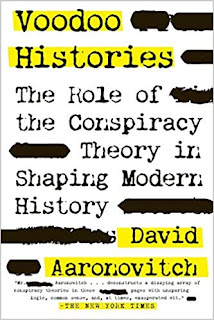Voodoo Histories
 |
| I love this cover |
This was such an interesting book! I'm very glad I picked it up at Moe's last year. (In fact, there are a couple others I wish I'd gotten too!)
Aaronovitch covers the histories of several conspiracy theories, in detail. It's fascinating, and also important, because they've had such an influence in modern history and we all -- no matter how skeptical or well-informed we are -- have a few stray thoughts that originated with a conspiracy theory.
We start off with the grand-daddy of them all: The Protocols of the Elders of Zion. I was already semi-aware of the history of this anti-Semitic forgery, but Aaronovitch provides a lot of information that I'd never heard. I knew it had been written by a Russian nobleman, but it turns out that it was discovered as a forgery within a decade or so. (I forget exactly how long and my kid nicked the book.) Not only that, most of it turned out to be directly plagiarized from a French novel satirizing Napoleon III...which was much older than the date of the supposed meeting it records. The Protocols has been known to be a forgery for over 100 years now, and yet it's still a tremendously popular 'source.'
From there, we move to Stalin's fake trials and obsession with Trotsky, and then some very complex American history that winds up taking in the New Deal, America First, the idea that "Roosevelt knew" about the attack on Pearl Harbor, and eventually the McCarthy era. And there's a lovely chapter about JFK's assassination, and even Marilyn Monroe gets a look-in.
One really interesting thing about this book was that Aaronovitch is British, and so he features several British conspiracy theories, some of which I'd never heard of. He covers not only the famous theories about Princess Diana's death (which would in fact have been pretty well impossible to orchestrate), but also the murder of an elderly lady involved in anti-nuclear protests and the suicide of a man caught up in a leak scandal.
One of my very favorite chapters, though, was about the development of Holy Blood, Holy Grail, hoaxes about the Priory of Sion (an admitted forgery), and all sorts of weirdness that eventually made its way into The Da Vinci Code, much to the exasperation of wearied tour guides all over Europe. And then the HBHG authors sued Dan Brown for plagiarism while simultaneously claiming their guff was history! It's a fairly astounding chapter.
He does not talk about moon landing hoaxes, though, or the anti-vaccine folks, or plenty of other things. Nobody could cover it all!
I was quite surprised to find out that Gore Vidal was an enthusiastic supporter of conspiracy theories. Who knew? Also, it's important, and difficult, and pretty disturbing, to tease out the threads of anti-Semitism that run through so many conspiracy theories. You can still see them today, and in fact they're getting more obvious.
Great book, I learned a lot, definitely a favorite of 2019. I can't exactly call this litany of lies, hoaxes, and delusions entertaining, but Aaronovitch does provide nice doses of wit and humor to keep the reader going through the swamp.




>>much to the exasperation of wearied tour guides all over Europe
ReplyDeleteHahahahahaha.
This book sounds SO good, and I'm adding it to the list right now even though I've had to implement very stringent rules on myself for nonfiction I'm allowed to get from the library. (I have to read one of my own nonfiction books for every nonfiction book I get from the library.) The thing about anti-Semitism seems massively true, and I'd like to know more about how that plays out/has played out in conspiracy theories over the years.
Ooo, that's a good rule. I'm so buried under all my fascinating non-fiction, and yet I keep getting more...
ReplyDeleteThe anti-Semitism is amazing, and so complex. And so often it starts off with quiet little indications that people don't understand at first. I know I've heard one woman (who fell into this stuff as a college student) say that it took her a while to figure out what 'international bankers' or whatever actually meant. Happily, she figured it out and left.
This sounds fascinating and has continued relevance.
ReplyDelete